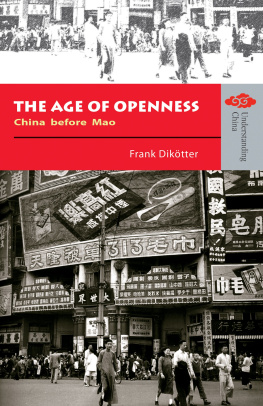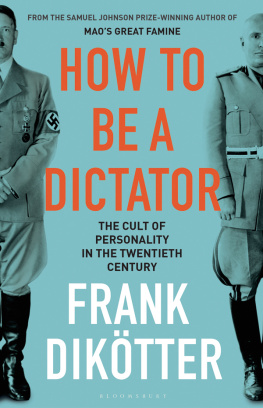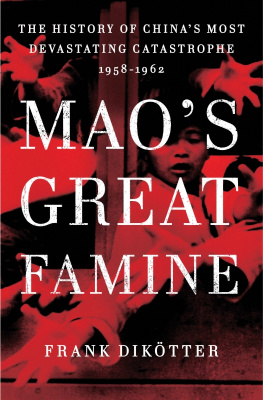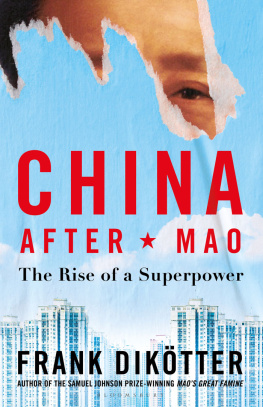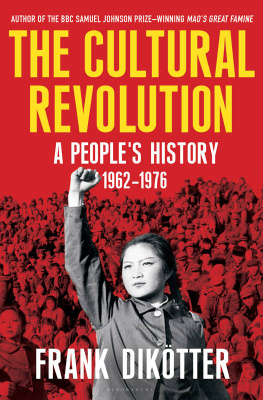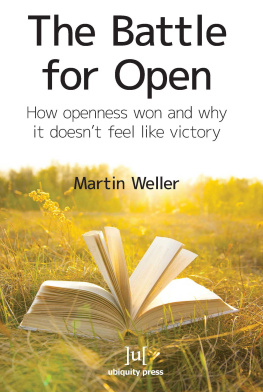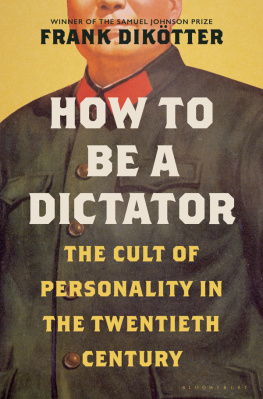Frank Dikötter - The Age of Openness
Here you can read online Frank Dikötter - The Age of Openness full text of the book (entire story) in english for free. Download pdf and epub, get meaning, cover and reviews about this ebook. year: 2008, publisher: HongKongUP, genre: Politics. Description of the work, (preface) as well as reviews are available. Best literature library LitArk.com created for fans of good reading and offers a wide selection of genres:
Romance novel
Science fiction
Adventure
Detective
Science
History
Home and family
Prose
Art
Politics
Computer
Non-fiction
Religion
Business
Children
Humor
Choose a favorite category and find really read worthwhile books. Enjoy immersion in the world of imagination, feel the emotions of the characters or learn something new for yourself, make an fascinating discovery.
- Book:The Age of Openness
- Author:
- Publisher:HongKongUP
- Genre:
- Year:2008
- Rating:3 / 5
- Favourites:Add to favourites
- Your mark:
- 60
- 1
- 2
- 3
- 4
- 5
The Age of Openness: summary, description and annotation
We offer to read an annotation, description, summary or preface (depends on what the author of the book "The Age of Openness" wrote himself). If you haven't found the necessary information about the book — write in the comments, we will try to find it.
The Age of Openness — read online for free the complete book (whole text) full work
Below is the text of the book, divided by pages. System saving the place of the last page read, allows you to conveniently read the book "The Age of Openness" online for free, without having to search again every time where you left off. Put a bookmark, and you can go to the page where you finished reading at any time.
Font size:
Interval:
Bookmark:
The era between empire and communism is routinely portrayed as a catastrophic interlude in China's modern history, but this engagingly written book shows instead that the first half of the twentieth century witnessed a qualitatively unprecedented trend towards openness.
Frank Diktter argues that the years from 1900 to 1949 were characterised at all levels of society by engagement with the world, and that the pursuit of openness was particularly evident in four areas: in governance and the advance of the rule of law and of newly acquired liberties; in freedom of movement in and out of the country; in open minds thriving on ideas from the humanities and sciences; and in open markets and sustained growth in the economy.
Freedom of association, freedom to travel, freedom of religion, freedom to trade and relative freedom of speech wrought profound changes in the texture of everyday life. While globalisation itself was a vector of cultural diversification, pre-existing constellations of ideas, practices and institutions did not simply vanish on contact with the rest of the world, but on the contrary expanded even further, just as much as local industries diversified thanks to their inclusion into a much larger global market. Arguably the country was at its most diverse in its entire history on the eve of World War II in terms of politics, society, culture and the economy.
Accessible to general readers, while providing an integration of ideas that will be valuable for specialists, this book presents a fresh way of approaching the history of modern China.
Frank Diktter is Professor of the Modern History of China at the School of Oriental and African Studies, University of London, and Chair Professor of Humanities at the University of Hong Kong. He is a key proponent of studying modern history from a global perspective and has published a series of innovative books which have transformed the field of Chinese history, from his classic The Discourse of Race in Modern China (1992) to the controversial Narcotic Culture: A History of Drugs in China (2004).
In this succinct and vigorous book, Frank Diktter presents a cornucopia of graphic examples to show that China in the first half of the twentieth century, far from being in a state of decay that called for revolutionary action, was in fact a vibrant and cosmopolitan society. In such a reading, the current Chinese leaders should not be seen as striving to do something bold and new; they are merely struggling to rebuild a network of global connections that Mao and others had systematically helped to destroy. This should be an ideal book to spark class discussion on modern China.
Jonathan Spence, author of The Search for Modern China and Return to Dragon Mountain
The always innovative Frank Diktter infuses new life into an historical period left by most historians for dead China's republican era from 1912 to 1949. In his persuasive recounting, this cosmopolitan, dynamic era has more to tell us about modern China's long-term trajectory than the authoritarian interlude that followed it.
Andrew J. Nathan, Class of 1919 Professor of Political Science, Columbia University
The Age of Openness
Understanding China: New Viewpoints on History and Culture
Each book in the Understanding China series provides a short and accessible guide to the research highlights of an active field of Chinese studies. Focusing on interdisciplinary work that bridges the humanities and social sciences , the books introduce readers to the subject, discuss the major problems and, by critically analyzing competing solutions and taking up new viewpoints, draw readers into the debates. The books are written in language accessible to readers outside Chinese studies, but are sufficiently informative, current and provocative also to engage the specialist reader.
Editors: David Faure, The Chinese University of Hong Kong and University of Oxford
Helen F. Siu, Yale University and the Hong Kong Institute for the Humanities and Social Sciences, The University of Hong Kong
Also in the series:
China and Capitalism: A History of Business Enterprise in Modern China
David Faure
A Social History of the Chinese Book and Literati Culture in Late Imperial China
Joseph P. McDermott
China: A Religious State
John Lagerwey
The Age of Openness
China before Mao
Frank Diktter

Hong Kong University Press
The University of Hong Kong
Pokfulam Road
Hong Kong
www.hkupress.org
Frank Diktter 2008
Reprinted 2010, 2014
ISBN 978-962-209-920-3 (Paperback)
ISBN 978-988-8268-71-9 (eBook)
All rights reserved. No portion of this publication may be reproduced or transmitted in any form or by any means, electronic or mechanical, including photocopy, recording, or any information storage or retrieval system, without prior permission in writing from the publisher.
British Library Cataloguing-in-Publication Data
A catalogue record for this book is available from the British Library.
First printing 2008
First eBook 2014
10 9 8 7 6 5 4 3
Acknowledgements
I am thankful to David Faure for the invitation to contribute to the series Understanding China: it provided me with a rare opportunity to sit back and make explicit, in the form of a long essay, some of the more general ideas which have grown out of a series of six more detailed research monographs I have published over the past fifteen years on the globalisation of ideas, institutions and commodities in modern China. A number of people have generously shared their ideas and suggestions with me and read and commented on draft versions, in particular Kingsley Bolton, University of Stockholm; John M. Carroll, University of Hong Kong; Joseph P. McDermott, Cambridge University; Christopher Hutton, University of Hong Kong; Angus Lockyer, School of Oriental and African Studies, University of London; Andrew Nathan, Columbia University; William T. Rowe, Johns Hopkins University; David Strand, Dickinson College; Francesca Tarocco, University of Manchester; and Arthur Waldron, University of Pennsylvania. I bear final responsibility for all errors and omissions.
F. D.
Hong Kong, August 2007
1 - Introduction
Sir John Plumb, one of the great social historians of the eighteenth century, once said that bland consensus does not do much to advance historical knowledge, and consequently that there is little point in accumulating facts within agreed frameworks of explanation. When we turn to the history of modern China, one of the most pervasive approaches in popular and scholarly accounts written during the Cold War was to take revolution as the key to historical change, so much so that revolutionary China and modern China were often synonymous. Opium Wars, Unequal Treaties and Peasant Rebellions, seen from such a perspective, are harbingers of decline in the nineteenth century, but the heart of darkness lies between the Sino-Japanese War of 1895 and the Civil War of 19461949. An enfeebled Qing is unable to resist the carving up of China by imperialist powers following its defeat in 1895, while a Boxer Rebellion shakes the very foundations of the empire, which soon collapses into chaos. Conventional wisdom has it that after the fall of the Qing in 1911 a weak and corrupt central government dependent on foreign loans is quickly succeeded by a string of rival warlords who bribe, coerce, plot and fight their way to power, as China disintegrates. A measure of political unification, we were told, is achieved by the Nationalist Party (Guomindang) in 1927, but endemic corruption, inept policies, political dissension, continued warfare and economic depression only deepen the countrys predicament, popular unrest and peasant immiseration fuelling the success of the Communist Party. Continuous encroachments by imperialist powers culminate in the countrys occupation by Japan after 1937, followed by a full-scale war between the Nationalist Party and the Communist Party from 1946 to 1949. Liberation at last closes a sombre chapter in the history of the country, as unification by Mao Zedong brings to an end a long series of humiliations: China Has Stood Up.
Next pageFont size:
Interval:
Bookmark:
Similar books «The Age of Openness»
Look at similar books to The Age of Openness. We have selected literature similar in name and meaning in the hope of providing readers with more options to find new, interesting, not yet read works.
Discussion, reviews of the book The Age of Openness and just readers' own opinions. Leave your comments, write what you think about the work, its meaning or the main characters. Specify what exactly you liked and what you didn't like, and why you think so.

